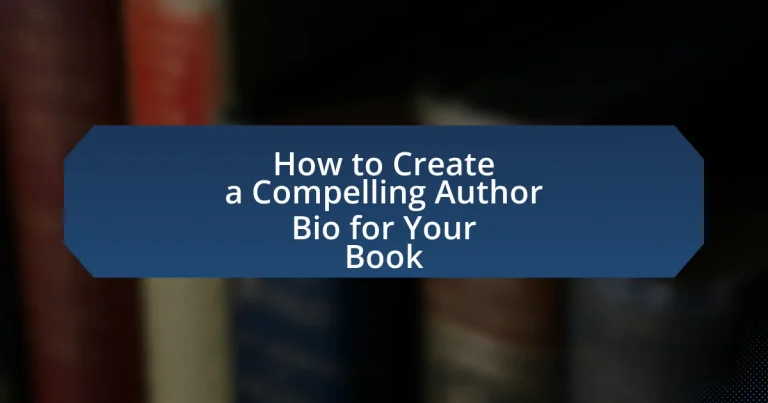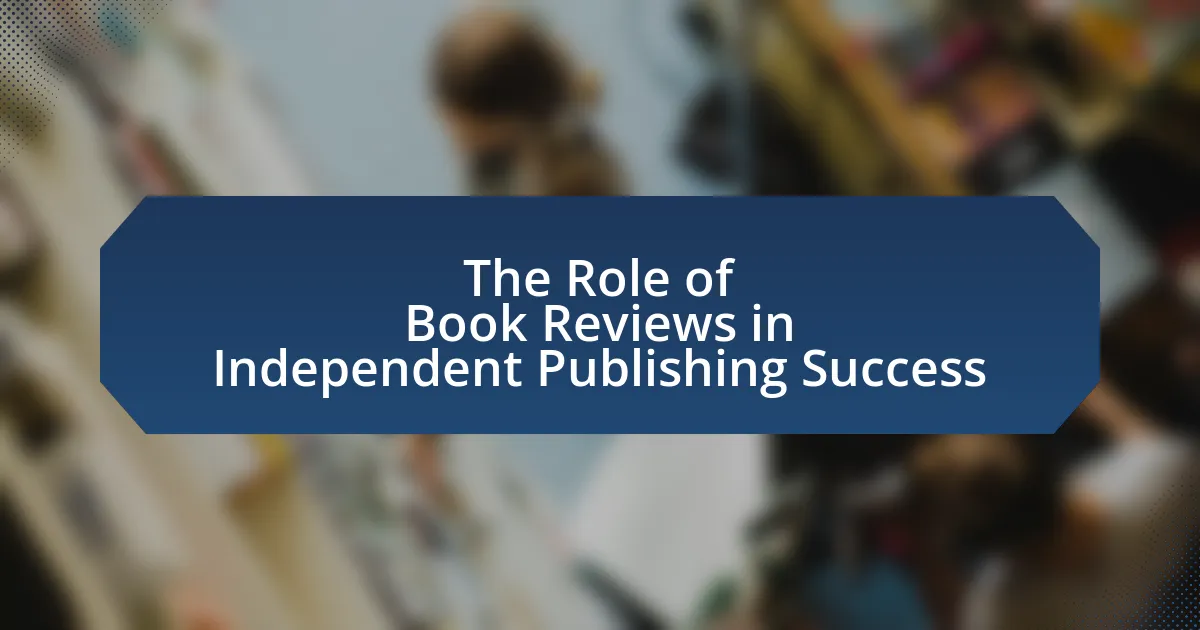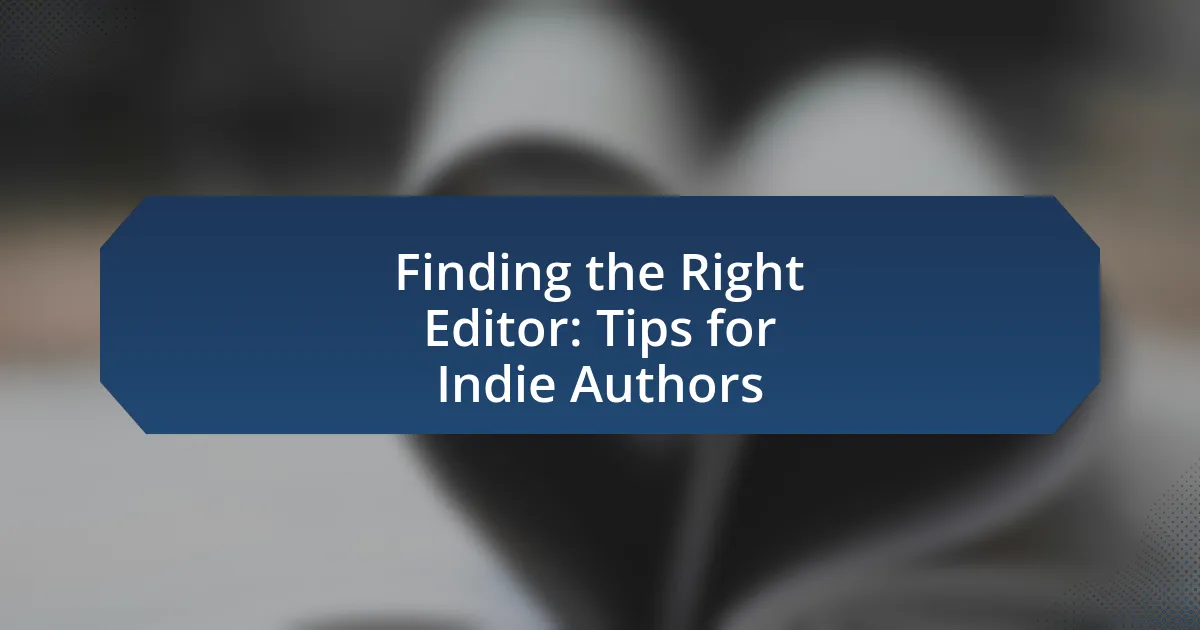A compelling author bio is a crucial element for authors seeking to establish credibility and connect with their audience. This article outlines the importance of a well-crafted author bio, detailing its role in enhancing reader engagement and influencing purchasing decisions. Key components of an effective bio include personal background, professional achievements, and a unique voice, all of which contribute to building trust and relatability. The article also provides practical steps for crafting an author bio, common mistakes to avoid, and best practices for tailoring the bio to different audiences, ensuring that authors can effectively market their work and resonate with readers.

What is a Compelling Author Bio?
A compelling author bio is a concise and engaging summary of an author’s background, achievements, and writing style that captures the reader’s interest. It typically includes relevant personal details, such as education, professional experience, and notable publications, while also reflecting the author’s unique voice and personality. For instance, a study by the Author’s Guild indicates that well-crafted author bios can significantly enhance reader engagement and increase book sales, demonstrating the importance of presenting oneself effectively in the literary market.
Why is an Author Bio Important for Your Book?
An author bio is important for your book because it establishes credibility and connects the author to the audience. A well-crafted bio provides readers with insights into the author’s background, expertise, and motivations, which can enhance their trust and interest in the book. For instance, a study by the Pew Research Center indicates that 70% of readers prefer to know about the author before purchasing a book, highlighting the significance of a compelling author bio in influencing buying decisions.
How does an Author Bio influence reader perception?
An Author Bio significantly influences reader perception by establishing credibility and relatability. When readers encounter an Author Bio, they assess the author’s qualifications, experiences, and personal background, which can enhance trust in the content. For instance, a bio that highlights relevant expertise or previous publications can lead readers to view the author as an authority in their field, thereby increasing the likelihood of engagement with the book. Research indicates that readers are more inclined to connect with authors who share personal anecdotes or relatable experiences, as this fosters a sense of familiarity and emotional connection. Thus, a well-crafted Author Bio not only informs but also shapes how readers perceive the author’s authority and relatability, ultimately affecting their reading experience.
What role does an Author Bio play in marketing?
An Author Bio plays a crucial role in marketing by establishing credibility and connecting with the target audience. It serves as a personal introduction that highlights the author’s qualifications, experiences, and unique voice, which can influence potential readers’ purchasing decisions. Research indicates that 70% of consumers are more likely to buy a product when they feel a personal connection to the brand or creator, underscoring the importance of a well-crafted Author Bio in building trust and engagement.
What Elements Make an Author Bio Compelling?
A compelling author bio includes personal background, professional credentials, unique voice, and relevant achievements. Personal background establishes a connection with readers, while professional credentials lend credibility to the author’s expertise. A unique voice differentiates the author from others, making the bio memorable. Relevant achievements, such as awards or notable publications, provide proof of the author’s capabilities and enhance their authority in the subject matter. These elements work together to create a bio that resonates with readers and encourages them to engage with the author’s work.
What personal details should be included in an Author Bio?
An Author Bio should include the author’s name, professional background, relevant writing experience, and any notable achievements or awards. These details establish credibility and connect the author to their work. For instance, mentioning previous publications or specific genres can help readers understand the author’s expertise. Including personal interests or hobbies can also create a relatable image, enhancing reader engagement.
How can professional achievements enhance an Author Bio?
Professional achievements enhance an Author Bio by establishing credibility and showcasing expertise. When authors include specific accomplishments, such as awards, publications, or relevant work experience, they provide tangible evidence of their qualifications, which can attract readers and publishers. For instance, an author who has won a prestigious literary award or has a background in a relevant field demonstrates authority, making their work more appealing. This credibility can lead to increased trust from potential readers, ultimately enhancing the author’s marketability and the perceived value of their writing.

How to Craft Your Author Bio?
To craft your author bio, start by clearly stating your name and your writing credentials or achievements. This establishes your authority and gives readers context about your expertise. Include relevant details such as the genres you write in, notable publications, or awards you have received, as these elements enhance your credibility. For example, if you have published multiple bestsellers or received literary awards, mention those specifics to substantiate your qualifications. Additionally, consider adding a personal touch, such as your interests or experiences that relate to your writing, to create a connection with your audience. This approach not only informs readers about your professional background but also makes you relatable, which can engage them further.
What steps should you follow to write an effective Author Bio?
To write an effective Author Bio, follow these steps: first, identify your target audience and tailor your bio to resonate with them. Next, include your professional credentials and relevant experiences that establish your authority in the subject matter. Then, add personal touches, such as hobbies or interests, to create a connection with readers. Finally, keep the bio concise, ideally between 100 to 200 words, ensuring clarity and engagement. These steps are supported by best practices in author marketing, which emphasize the importance of relatability and credibility in connecting with readers.
How do you determine the right tone for your Author Bio?
To determine the right tone for your Author Bio, first assess your target audience and the genre of your writing. The tone should align with the expectations of your readers; for instance, a formal tone suits academic works, while a conversational tone is appropriate for fiction. Additionally, consider your personal brand and the message you want to convey about yourself as an author. Research shows that bios with a tone consistent with the author’s writing style enhance reader connection and engagement, as noted in a study by the University of Southern California, which found that authenticity in author bios increases reader trust.
What length is ideal for an Author Bio?
The ideal length for an author bio is typically between 100 to 200 words. This range allows authors to provide essential information about their background, expertise, and achievements without overwhelming the reader. Research indicates that concise bios are more engaging and easier for readers to digest, making them more effective in capturing attention and conveying credibility.
How can you tailor your Author Bio for different audiences?
To tailor your Author Bio for different audiences, focus on the specific interests and values of each group. For example, when addressing a literary audience, emphasize your writing credentials, awards, and relevant publications. Conversely, for a business audience, highlight your professional experience, industry expertise, and any relevant achievements. Research indicates that personalized content increases engagement; a study by HubSpot found that personalized emails have a 29% higher open rate. By aligning your bio with the audience’s expectations, you enhance relatability and connection, making your bio more effective.
What adjustments should you make for a literary audience?
To effectively engage a literary audience, you should emphasize your literary credentials and experiences. Highlight relevant publications, awards, and any literary affiliations to establish credibility. For instance, mentioning specific literary journals where your work has appeared or notable awards you have received can enhance your bio’s appeal. Additionally, use a tone that reflects your literary style, incorporating elements of your writing voice to resonate with readers who appreciate nuanced language and depth. This approach aligns with the expectations of a literary audience, who often seek authenticity and a connection to the author’s literary journey.
How can you modify your Author Bio for a general audience?
To modify your Author Bio for a general audience, focus on simplifying language and emphasizing relatable experiences. This approach ensures that the bio resonates with a wider readership, making it accessible and engaging. For instance, instead of using jargon or niche references, describe your background and achievements in straightforward terms that highlight common interests or experiences. Research indicates that clear and relatable communication increases reader engagement, as seen in studies showing that audiences prefer content that reflects their own experiences and values.

What Common Mistakes Should You Avoid in Your Author Bio?
Common mistakes to avoid in your author bio include being overly verbose, lacking focus on relevant achievements, and failing to convey your unique voice. An overly verbose bio can dilute your message, making it less engaging; research shows that concise writing increases reader retention. Additionally, not highlighting relevant achievements can lead to a lack of credibility; for instance, mentioning specific awards or publications can enhance your authority. Lastly, neglecting to convey your unique voice may result in a generic bio that fails to connect with readers; a study by the American Psychological Association indicates that personal storytelling can significantly enhance reader engagement.
What are the pitfalls of writing an Author Bio?
The pitfalls of writing an Author Bio include being overly self-promotional, lacking authenticity, and failing to connect with the target audience. Overly self-promotional bios can alienate readers, as they may perceive the author as insincere or egotistical. Authenticity is crucial; if an author presents a persona that does not align with their true self, it can lead to distrust among readers. Additionally, failing to consider the target audience can result in a bio that does not resonate, making it less effective in engaging potential readers. These pitfalls can diminish the impact of the bio, ultimately affecting the author’s ability to connect with their audience and promote their work effectively.
How can clichés undermine your Author Bio?
Clichés can undermine your Author Bio by making it sound generic and unoriginal, which fails to engage readers. When an author relies on overused phrases or ideas, it diminishes their uniqueness and can lead to a lack of credibility. Research indicates that originality in writing is crucial for capturing audience interest; for instance, a study published in the Journal of Creative Behavior found that readers are more likely to connect with content that showcases distinctiveness rather than familiar tropes. Therefore, avoiding clichés is essential for creating a compelling and memorable Author Bio.
What should you avoid including in your Author Bio?
You should avoid including irrelevant personal details in your Author Bio. This includes excessive information about your hobbies, family, or unrelated career experiences that do not contribute to your credibility as an author. Focusing on relevant qualifications, writing experience, and published works enhances your bio’s effectiveness, as readers are primarily interested in your expertise related to the content you produce.
How can you ensure your Author Bio stands out?
To ensure your Author Bio stands out, focus on highlighting unique personal experiences and achievements that relate to your writing. Including specific details, such as notable awards or relevant life events, can create a memorable impression. For instance, if you have won a literary award or have a background in a field that informs your writing, mentioning these elements can enhance credibility and interest. Research indicates that bios that convey authenticity and personality are more engaging, as readers often connect better with authors who share their stories.
What unique elements can you incorporate to make your Author Bio memorable?
To make your Author Bio memorable, incorporate personal anecdotes, unique hobbies, and specific achievements. Personal anecdotes create a connection with readers, making your bio relatable and engaging. Unique hobbies, such as unusual skills or interests, can set you apart from other authors, adding a distinctive flair. Specific achievements, like awards or notable publications, lend credibility and showcase your expertise, reinforcing your authority in your writing genre. These elements combined create a compelling narrative that resonates with readers and enhances your overall presence as an author.
How can storytelling enhance your Author Bio?
Storytelling can enhance your Author Bio by making it more engaging and relatable to readers. When authors incorporate personal anecdotes or narratives, they create a connection that resonates emotionally, allowing readers to see the person behind the work. Research indicates that stories activate the brain’s mirror neurons, which can foster empathy and understanding, making the author more memorable. For instance, a study published in the journal “Psychological Science” found that narratives can significantly improve information retention, suggesting that a well-crafted story in an Author Bio can leave a lasting impression on potential readers.
What are some best practices for writing an Author Bio?
To write an effective Author Bio, focus on clarity, relevance, and authenticity. Start with a concise introduction that includes your name and professional credentials, establishing your authority in the subject matter. Incorporate personal elements that resonate with your audience, such as your writing journey or motivations, to create a connection. Use a professional tone while ensuring the bio reflects your personality, making it relatable. Keep the length between 100 to 200 words to maintain reader engagement. Finally, include links to your website or social media for further engagement, as this can enhance your visibility and accessibility to readers.
How often should you update your Author Bio?
You should update your Author Bio at least once a year or whenever significant changes occur in your career or personal life. Regular updates ensure that your bio reflects your most current achievements, publications, and relevant experiences, which can enhance your credibility and connection with readers. For instance, if you publish a new book, receive an award, or change your professional focus, these milestones warrant an immediate update to keep your bio accurate and engaging.
What resources can help you refine your Author Bio?
Resources that can help refine your Author Bio include writing guides, online workshops, and professional editing services. Writing guides, such as “The Artist’s Way” by Julia Cameron, provide structured exercises to enhance creativity and self-expression, which can improve the quality of your bio. Online workshops, like those offered by platforms such as Coursera or MasterClass, often feature industry experts who share insights on crafting effective bios. Professional editing services, such as Scribendi or Reedsy, offer personalized feedback and revisions to ensure clarity and impact in your bio. These resources collectively enhance the effectiveness and professionalism of an Author Bio.





